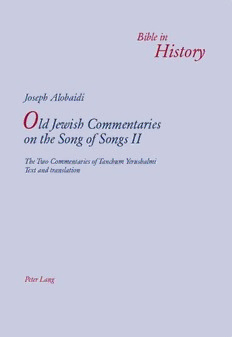
Old Jewish Commentaries on the Song of Songs II: The Two Commentaries of Tanchum Yerushalmi. Text and Translation PDF
Preview Old Jewish Commentaries on the Song of Songs II: The Two Commentaries of Tanchum Yerushalmi. Text and Translation
Bible in This book contains two commentaries on the Song of Songs by 10 Tanchum Yerushalmi (c. 1220-1291), one of the best representa- History tives of rational exegesis in the Middle Eastern rabbinical school of thought. His in depth knowledge of the Bible as well as his acquaintance with Greek philosophy, added to familiarity with his own Jewish tradition allowed him to write rich biblical com- mentaries. In so doing he showed himself as a worthy disciple of Saadia Gaon, Hai and Ibn Janah whom he mentions in his commentary on the Song of Songs. The extent of his knowledge Jo Joseph Alobaidi s can easily be seen in both his philological and philosophical ep h commentaries on one of the most intriguing books of the Bible. A O lo ld Jewish Commentaries b a i d i on the Song of Songs II • oO n l d t h J e Sew The Two Commentaries of Tanchum Yerushalmi oi nsh Text and translation g C o fo Sm om n ge sn Ita Ir i e s Peter Lang ISBN 978-3-0343-1505-0 www.peterlang.com Old Jewish Commentaries on the Song of Songs II Bible in History Bible in History focuses on biblical interpretation in different ages and countries and is a series dedicated to studies of biblical exegesis as well as to research about principles of interpretation relevant to interpreters of the Bible. The series is open to studies focusing on philological and theological aspects of particular Bible passages but it also welcomes publications in the field of history of biblical interpretation that study the development of new ideas and their impact on the interpretation of the text. Editions of textual variants as well as of influential old and modern commentaries are also within the scope of this series The series accepts publications in French and English. Series published by Joseph Alobaidi PETER LANG Bern · Berlin · Bruxelles · Frankfurt am Main · New York · Oxford · Wien Joseph Alobaidi Old Jewish Commentaries on the Song of Songs II The Two Commentaries of Tanchum Yerushalmi Text and translation PETER LANG Bern · Berlin · Bruxelles · Frankfurt am Main · New York · Oxford · Wien Bibliographic information published by die Deutsche Nationalbibliothek Die Deutsche Nationalbibliothek lists this publication in the Deutsche Nationalbibliografie; detailed bibliographic data is available on the Internet at ‹http://dnb.d-nb.de›. British Library Cataloguing-in-Publication Data: A catalogue record for this book is available from The British Library, Great Britain Library of Congress Cataloging-in-Publication Data is available ISSN 1422-5972 pb. ISSN 2235-5723 eBook ISBN 978-3-0343-0452-8 pb. ISBN 978-3-0352-0247-2 eBook © Peter Lang AG, International Academic Publishers, Bern 2014 Hochfeldstrasse 32, CH-3012 Bern, Switzerland [email protected], www.peterlang.com All rights reserved. All parts of this publication are protected by copyright. Any utilisation outside the strict limits of the copyright law, without the permission of the publisher, is forbidden and liable to prosecution. This applies in particular to reproductions, translations, microfilming, an storage and processing in electronic retrieval systems. Printed in Switzerland For Iris Théodoloz And family Contents Preface........................................................................................... IX The Manuscript ............................................................................. XI The Judeo Arabic text ..................................................................... 3 The Translation of the First Commentary Chapter 1 ....................................................................................... 93 Chapter 2 ...................................................................................... 131 Chapter 3 ...................................................................................... 147 Chapter 4 ...................................................................................... 153 Chapter 5 ...................................................................................... 161 Chapter 6 ......................................................................................169 Chapter 7 ...................................................................................... 175 Chapter 8 .................................................................................... 183 The Translation of the Second Commentary Chapter 2 ...................................................................................... 197 Chapter 3 ..................................................................................... 209 Chapter 4 ..................................................................................... 223 Chapter 5 ..................................................................................... 239 Chapter 6 ..................................................................................... 259 Chapter 7 ...................................................................................... 271 Chapter 8 ..................................................................................... 291 Index of Biblical quotations ........................................................ 309 Preface This is the second of four volumes concerning medieval Jewish commentaries on the Song of Songs. Yefet Ben Eli’s commentary was published in volume one, issued more than three years ago. This second volume, containing two commentaries of Tanchum Yerushalmi, will be followed by a third with two shorter and anonymous commentaries. A synopsis of the translations with an evaluation of five commentaries, plus one by R. Saadia Gaon, recently published, will form the contents of the fourth and final volume of this series. My preference goes to a full volume of a comparative study rather than a theological and philological introduction to each commentary. Tanchum Yerushalmi was certainly aware that while the Books of the Hebrew Bible have symbolic parts, The Song of Songs is entirely symbolic. This particularity of The Songs played a role in the organization of Tanchum’s work. At first, he starts with a global commentary; an explanation of all the elements of the Book: The obvious meaning of words, philological difficulties, and symbolic meaning of expressions. This can clearly be seen in his commentary on Song 1-2:7. It was an attempt to comment on the totality of elements he found important to explain. Certainly for reason of clarity and in order to make his commentary more accessible that Tanchum opted, albeit well in his commentary of chapter two, for another method: Writing two commentaries on the Song of Songs. Yet, he did not follow the rule he himself established. Instead of writing a philological commentary, followed by another more theological and philosophical, he often in his second commentary returned to explain a word or an expression he left out in his first commentary. Furthermore, it happened that having finished the commentary on a chapter and
